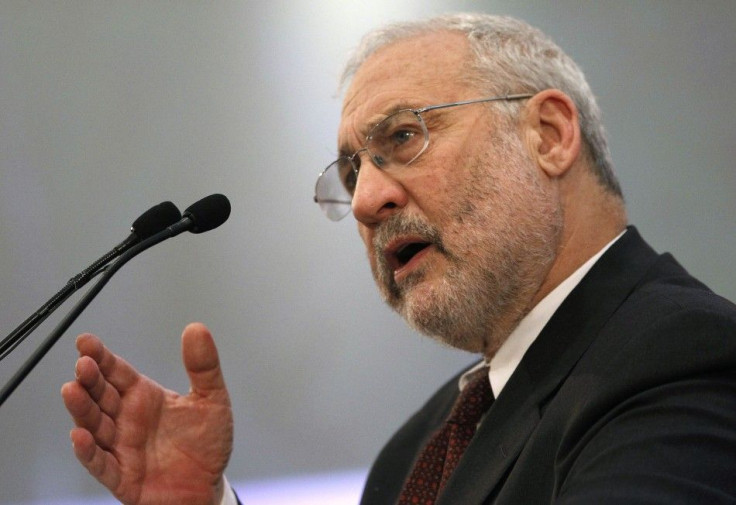What’s still wrong with U.S. financial institutions: Stiglitz

Professor Joseph Stiglitz of Columbia is a rare individual who has both been a part of the financial elite and is now critical of many of the practices of his former crowd.
He was the Chief Economist of the World Bank and advised President Bill Clinton in the mid-1990s. Since then, Stiglitz, a well-known public figure and highly-respected economist in academia, has often questioned some of the same institutions that he formerly served under or advised.
In the last few years, he shifted his attention to the causes and culprits of the global financial crisis. Much of his thoughts on this subject can be found in his recent book Freefall: America, Free Markets, and the Sinking of the World Economy.
“It wasn’t an accident; it was man-made,” he said in an interview with IBTimes. In particular, Stiglitz blamed US financial institutions and the laws that enabled their damaging behavior.
Since the financial crisis, some progress has been made as far as regulations go. However, Stiglitz thinks they don’t go far enough and there are still unresolved issues.
Below are excerpts from the interview.
IBT: You said your book is about the battle of ideas. What ideology and debate would you like to see?
Stiglitz: Market fundamentalism has failed. The fall of the Berlin Wall killed Communism. My hope is that the financial crisis would kill the idea that markets can sort things out by themselves.
However, my disappointment is that in many quarters, this ideology remains more robust than I had anticipated.
Some think the crisis was just an “accident” or “tsunami” that happened to us. But it was actually something man-made.
IBT: I think Lloyd Blankfein [the CEO of Goldman Sachs] called it a 100-year storm.
Stiglitz: Right. But it was actually avoidable.
Unfortunately, the financial sector has a lot of money and influence. The reforms have only partially corrected the problems. The good news is they did more than what I thought they’d do in my darkest days.
But, it’s [been] much weaker than what we need.
If you look at the [Dodd-Frank reform] bill, it recognizes a lot of the principles, but there were too many exception and exemptions.
IBT: Can you give some examples?
Stiglitz They recognize banks behaved very badly with consumers. So we passed legislation to address predatory lending, but we exempted auto loans. Why should you be able to be predatory on auto loans? What was the principle?
The principle is they paid more money!
IBT: The lobbyists?
Stiglitz: Right, the lobby.
Second example: should the government be underwriting the speculation of banks? The CDS (credit default swap) and that kind of thing? The Senate had a bill saying “no, if you’re FDIC, you shouldn’t write CDS.” That made perfect sense. It doesn’t say CDS won’t be written; it just says banks should be in banking, not gambling.
What did we end up doing? We said banks shouldn’t do some kinds of gambling, but they can do other kinds of gambling. Where is the principle?
These have been political compromises that have undermined confidence in the government.
IBT: Getting back to ideology. Some still believe in market fundamentalism; they just think we need better rules. A little tweak here and there. What do you say to that?
Stiglitz: The good news is that they recognized that unfettered markets don’t work, and that’s a big concession. [Former Fed Chairman] Alan Greenspan said we can trust self-regulation. [Ben] Bernanke said we can trust self-regulation. That view is dead, and that’s a big victory.
Once you go across that bridge, where you draw you the line is a question of debate. But that’s a fundamental concession.
If you know markets don’t work sometimes, you then have to ask, “what are the things where they don’t work and therefore, what is role of government?”
Once you go down that route, you start to identify externalities and consumer protection. Then, you’re moving towards the view of what we ought to be doing.
However, people like Lloyd Blankfein haven’t crossed that bridge yet. People like [JPMorgan Chase CEO] Jamie Dimon say, “we made a mistake, but now we learned a lesson, so trust us.” But we would say, “why should we trust you?”
There are two other issues.
One is anti-trust. Banks act in an anti-competitive way. Two, they often act in a non-transparent way. Well-functioning markets require transparency.
You have to understand how incoherent banks are. In the 1997 Asian financial crisis, they complained about East Asia being not transparent enough. Now, they’re arguing against transparency in CDS.
What comes out of that is clearly hypocrisy. They’re saying “we lost money in East Asia because it wasn’t transparent, so we don’t like that. We make money in America on the lack of transparency, and we like that.”
How do you interpret that? It’s “what makes us money.”
IBT: What do you mean by anti-competition? I thought different Wall Street firms are trying to kill each other off.
Stiglitz: You compete in some dimensions and you don’t in others. So in CDS, there is a club of about five firms that do 90 percent of the business.That’s a club.
In the credit card business, what’s interesting is that they developed a structure where they don’t allow competition in many dimensions. They have something called the “Honor All Cards” rule. They’re trying to destroy the price system. In a competitive market, you can’t destroy the price system. So the major players conspire to make sure the price system doesn’t work. They get $30 to $40 billion out of this per year.
You see the size of the profits, and you say, “they can’t get profits like that in a competitive industry.”
To read more Global Markets interviews, click here
Email Hao Li at hao.li@ibtimes.com
Click here to follow the IBTIMES Global Markets page on Facebook.
Click here to read recent articles by Hao Li.
© Copyright IBTimes 2024. All rights reserved.





















